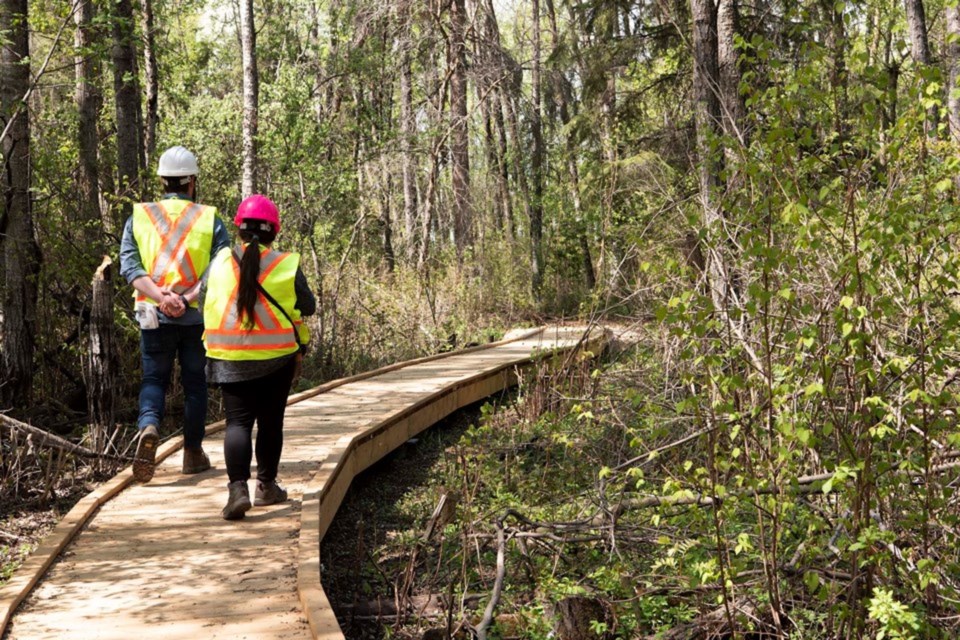St. Albert city council narrowly voted against spending $3,600 to install “anti-slip material” on the Grey Nuns White Spruce Park boardwalk, although council will soon debate adding anti-slip material to all city-owned boardwalks and wooden walkways.
The installation was something council had already voted to do last fall, and was set to be funded through the roughly $190,000 in leftover project funds the city has following the $3.1 million renovation undertaken at the park in 2022. However, Mayor Cathy Heron voted against the installation after previously voting in favour of it during 2024 budget deliberations.
The motion put forward by Coun. Sheena Hughes last fall sought to install the anti-slip material out of concern for park users' safety, but council was asked to vote on the project again on May 21 after administration reported the park's new boardwalk was still covered under warranty. Administration recommended a project budget increase of $9,700 to hire the original contractor to install the material in order to ensure there were no warranty complications.
Hughes put forward an alternative motion on May 21 which sought to have city staff install the material after the warranty expired in November of this year so just $3,600 would be spent, but, Heron, Coun. Natalie Joly, Coun. Ken MacKay, and Coun. Mike Killick voted against the motion, effectively killing the project.
Joly, who also voted against the project last fall, argued during the May 21 meeting she didn't think residents wanted the material installed, and the anti-slip material actually introduced a hazard to the boardwalk rather than the material making it safer because it was a potential tripping hazard.
To make her point that residents opposed the installation, Joly read five comments she received from residents about the project, all of which were either concerned about the cost or thought the anti-slip material unnecessary.
“[One] resident said, ‘I don't think this is needed, and I'm out there in all kinds of weather and never found it slippery except when it's icy in winter and anti-slip strips won't help then,’” Joly told the rest of council.
For Heron, having a project that increased or changed a level of design or service at one city-owned boardwalk and not all city-owned boardwalks was why she decided not to support the project this time.
“Doing one-offs is not governance,” Heron said during debate. “I would actually suggest that we vote against this one and re-approach this from a governance level which is a service level.”
Hughes said she agreed, and at the end of the council meeting put forward a motion for council to debate later this year that directs administration to develop a capital project to install anti-slip material on all “at-risk city-owned wooden platforms, boardwalks, bridges, and structures,” while also making the material a guaranteed piece of designs for all applicable structures built by the city moving forward.
“If we have things that we think are a high likelihood of residents hurting themselves on it, this should be evaluated,” Hughes said. “The intention behind this is safety, so could someone trip? Yes. Can someone trip on anything? Yes. But ... are we making it safer by not putting it on there or safer by putting it on there?”
Hughes also took issue with several councillors, including Joly and MacKay, arguing anti-slip material wasn't necessary because they went to the boardwalk and didn't find it slippery.
“We keep talking about inclusiveness and then we say, ‘Well, I walked on it so we're fine,’ ignoring the fact ... that many people [like] seniors or other people who have mobility issues may not be able to experience the same level of confidence as you did on that structure,” Hughes said.
Supporting Hughes was Coun. Wes Brodhead, who said he also would have supported hiring the park's original contractor to install the material because it was a small cost to pay for community safety.
“From my perspective, this is not a bad level of service that we shouldn't be encouraging for all of our city wooden walkways to include,” Brodhead said. “Because other communities don't do that, I'm not sure that that's an argument for not doing it here.”
“It's not unheard of, and quite honestly I think it's not a bad level of service to consider for our community; it is a safety issue.”
A report to council about the project, written by Manda Wilde, a city supervisor of parks planning and stewardship, says the city hasn't received any complaints or concerns from residents about existing boardwalks being slippery or advocating for the installation of anti-slip material, although “the city's typical practice is to accept and monitor the risks related to slippery wooden decking.”




